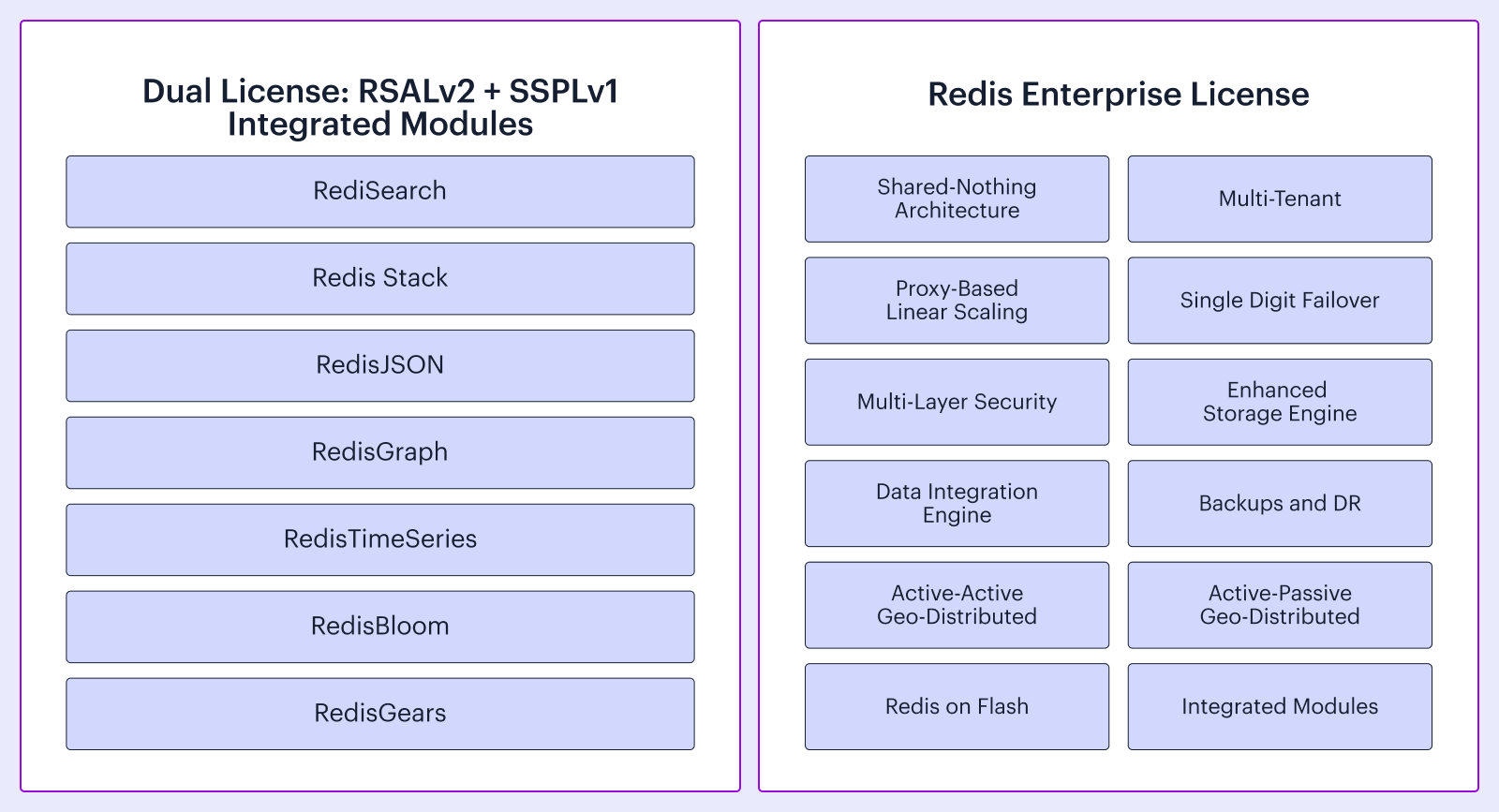Redis Enterprise is closed source and requires a commercial license from Redis Ltd. For information on Redis Cloud licensing, read more here. For information on Redis Enterprise Software licensing, read more here.

RSALv2 is a permissive, non-copyleft license created by Redis Ltd., allowing users the right to “use, copy, distribute, make available, and prepare derivative works of the software” and has only two primary limitations. You may not:
Note that RSALv2 has not been approved by the OSI, and we do not refer to it as an Open Source license.
SSPL is a source-available license created by MongoDB, who set out to craft a license that embodied the ideals of open source, allowing free and unrestricted use, modification, and redistribution, with the simple requirement that if you provide the product as a service to others, you must also publicly release any modifications as well as the source code of your management layers under SSPL.
SSPL is based on GPLv3, and is considered a copyleft license. This means that if you use the source code and create derivative works, those derivative works must also be licensed under SSPL and released publicly. For more information, MongoDB has a good FAQ.
Note that SSPL has not been approved by the OSI, and we do not refer to it as an Open Source license.
Since November 15th, 2022, our default binary distributions of Redis Stack and Redis modules have been released under RSALv2 or SSPLv1. When using the source code, users can apply either RSALv2 or SSPLv1. As shown in the table below, RSALv1 is applied to older versions of Redis Stack and Redis modules, including fixes and patches.
| Module | RSALv1 | Binary distribution: RSALv2 Source code: RSALv2 or SSPLv1 |
| Redis Stack | <= 6.2.4 | >= 6.2.6 |
| RediSearch | <= 2.4 | >= 2.6 |
| RedisJSON | <= 2.2 | >= 2.4 |
| RedisGraph | <=2.8 | >=2.10 |
| RedisTimeSeries | <=1.6 | >= 1.8 |
| RedisBloom | <= 2.2 | >=2.4 |
| RedisGears | <=1.2 | >= 2.0 |
We believe the permissive approach of RSALv2 and the standard wording we use to define its limitations solves many of the challenges raised by our community, but we are also aware that, like any newly created license, it will take time for some users (and their legal teams) to digest it and therefore we’ve added an option to use SSPL. Created by MongoDB and adopted by Elastic and many others, SSPL is becoming the de facto standard for source available licenses and is being used by millions of developers worldwide.
This dual-license approach will allow users to choose between a permissive but less known license, RSALv2, or a more standardized but copyleft license, such as SSPL.
Nothing changes for you. Our default distribution continues to be free and open under the Redis Source Available License, as it has been for nearly the last four years. With the Redis Source Available License 2.0, we have standardized the license terms and kept the license very permissive. If you build applications on top of Redis modules, nothing changes for you.
Our client libraries continue to be licensed under the open-source MIT license.
First, a big thank you! As long as you have signed the Contributor License Agreement, you can continue contributing to the Redis modules as you always have.
This change will not affect customers and partners using our Redis Cloud or Software products.
This source code license change should not affect you – you can use our default distribution or develop applications on top of it for free under the RSALv2. This source-available license does not contain any copyleft provisions, and the default functionality is free of charge.
For further clarification, please reach us at redis_licensing@redis.com.
This should not affect you.
We do not consider providing Redis modules as a service internally or to subsidiary companies as making them available to a third party. For further clarification, please reach us at redis_licensing@redis.com.
Absolutely! The idea behind the Redis Source Available License is to help grow the ecosystem around Redis Stack and Redis modules. Commercial support by a third party is more than welcome in this spirit.
Yes. In this sense, RSALv2 is similar to many permissive open-source licenses. You can modify the software, integrate the variant into your application, and distribute and sell your application as long as your application is compliant with the limitations defined under the RSALv2 license.
Yes. The license change is not retroactive. This means all source code and releases prior to the change remain under the 3-clause BSD license. You may continue to use those versions indefinitely under the original license, as long as you abide by its terms and conditions. Redis plans to continue to provide security updates and address other critical defects within these releases until Redis Community Edition is available per our current security policy.